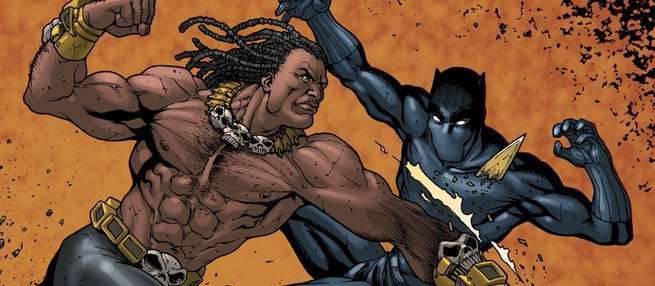Black superheroes have undergone a necessary evolution over the last 50 years. Luke Cage was originally a jive-talking hero-for-hire, but he’s become an altruistic mainstay of the Marvel heroes. Storm leads the X-Men, while Black Panther makes decisions that gravely affect the state of the universe. The growth and variation of black superheroes has brought them out of the shadows.
But we’re still lacking the same sort of evolution and diversification for great black supervillains. Off the top of your head how many can you name? And of those, how many are iconic?
Perhaps the one that’s most likely to come to mind is Black Manta, Aquaman‘s ill-tempered foe, and one of the most prominent black supervillains in comics; but even he may raise a few eyebrows.
Black Manta’s helmet and suit offer complete ambiguity. Truth is, as readers we don’t know who’s under the mask; we can only assume. And that’s what most readers did, until Manta’s famous helmet reveal in 1993 confirmed why his name is truly Black Manta. But Manta’s first appearance was in 1967’s Aquaman #35; his black heritage was kept a secret from readers for 26 years! And even after the reveal, he’s rarely seen outside his glossy black latex number.
Marvel’s most familiar black villains include Black Mariah (Mariah Dillard, for those familiar with the Luke Cage Netflix series), the Black Panther villain Man-Ape, and the albino Spider-Man villain Tombstone, all of whom fall into the “thug” or “streetwise” cliches that characterized many of the early black heroes. The X-Men foe Apocalypse is perhaps Marvel’s most notable example of a black supervillain, but like Manta, his blackness is obscured. He’s Egyptian, but his blue skin and armored costume make him appear more alien than human.
While black superheroes have made vast strides to escape these stereotypes, villains are still pigeonholed as mob bosses, gangsters, and heavies, boasting brute strength and fighting acumen rather than wit or intelligence. These characters follow lowbrow henchman archetypes, instead of occupying mastermind roles like Lex Luthor, Magneto, or Loki. The few villains that subvert these stereotypes, like the Marvel villain Doctor Positron, or the animated Young Justice version of Queen Bee, are woefully underused and barely seen.
